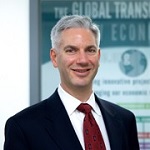 |
| Marc Blaustein |
Marc Blaustein never said it would be easy to develop a new drug for Duchenne muscular dystrophy. But even though he doesn't have the biggest organization, the most money or a full set of human data on key endpoints, he has been making some steady, early progress on his quest.
This morning Blaustein, CEO of the renamed biotech Akashi Therapeutics (formerly Halo), unveiled a few new moves in that journey. The FDA awarded fast-track status for HT-100, an oral small molecule therapy that Blaustein believes could make it into one of the future cocktail therapies needed to help keep this lethal disease in check. A group of nonprofits, led by the Muscular Dystrophy Association, added some more cash to the company till, bringing the contribution of all the nonprofits up to $2.5 million--which is in addition to the money Charley's Fund and the Nash Avery Foundation have invested as founders of the company. And he has the first preliminary snapshots on the drug's activity on biomarkers for the disease in the first two groups totaling 12 patients in a Phase Ib/IIa study.
Two years ago, when Blaustein first talked to FierceBiotech, he was the only full-timer on the staff of Cambridge, MA-based Akashi. Now there's a core team of 12 in the virtual organization, which includes some consultants. In addition to HT-100, which is slated to finish its Phase Ib/IIa study of 30 patients in 2015, Akashi now has another Duchenne therapy coming up behind it. And there are in-licensing talks underway as well to help build a pipeline.
"What we've got is early proof-of-concept of biological activity," Blaustein tells FierceBiotech, "showing that the drug is doing what we hoped it would do." Specifically, biomarkers are demonstrating a decrease in the formation of collagen and the degradation of collagen, which could go on to help counter the disease. This is very preliminary evidence of anti-inflammatory, anti-fibrotic and muscle-building activity, though, and will need to be put to the test on key endpoints like a 6-minute walk test and pulmonary and cardiac function.
Akashi's nonprofit supporters, which include a whole legion of fired up parents, offer more than financial aid. The FDA in particular has been listening carefully to the lineup of organizations urging the agency to help speed along something--anything--that promises to slow or ameliorate this rare disease, which steadily erodes a victim's muscles until the day they suffer an early death. And that can help give a small biotech like Akashi a larger profile among regulators.
The most visible biotechs in the field, Sarepta, Prosensa and PTC, have all experienced euphoric highs and gut-wrenching lows over the past year as they move ahead on the dystrophin-replacement front. Prosensa's partner GlaxoSmithKline ($GSK) dumped their collaboration after a failed Phase III, but Prosensa says it's regrouped and understands what it needs to do now in the clinic. Sarepta built hopes of an accelerated approval, then yanked the rug out from under investors' feet on regulatory doubts about its tiny study, then came back with a blueprint to get that accelerated approval. PTC's therapy has only failed in late-stage studies, but the EU appears ready to reverse itself on an initial rejection of the company's appeal for an early OK in Europe.
To say the least, it's been a roller coaster ride. But Blaustein notes that Akashi's approach is designed to complement rather than compete against the drugs now in development for various mutations of the disease.
"We know it will take a cocktail of therapies to turn Duchenne muscular dystrophy into a chronic, manageable diseases," he adds. "We think HT-100 will be a core component, as a monotherapy and in concert with other drugs."
Next steps include following up on partnership talks and looking for at least $6 million to $8 million in more traditional investor cash to take the company on the next big leg of the trip: Past the Ia/IIb proof-of-concept and into a pivotal study as the company creates a pipeline.
That won't be easy, either. But Akashi's new name is built around the name for the world's largest suspension bridge. And you don't build one of those overnight.
- here's the release on the fast-track status
- here's the release on the new money raised
- here's the release on the preliminary drug activity